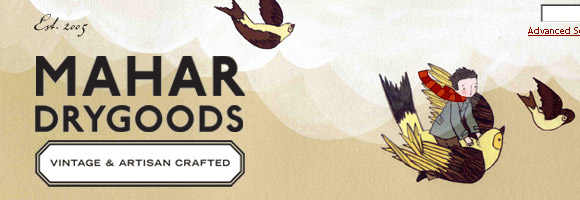by Arianne Foulks of Aeolidia
 With more and more crafters and home-based businesses setting up shop on the web, how can you stand out to customers as someone who will send a high quality product, send it on time, and help if there are any problems with the order?
With more and more crafters and home-based businesses setting up shop on the web, how can you stand out to customers as someone who will send a high quality product, send it on time, and help if there are any problems with the order?
On Etsy, eBay, or Amazon, trust for individual sellers is established by the parent site’s reputation and policies, along with the customer reviews system. How can you improve on that if you’re an Etsy seller or create that trust if you run your own online shop?
Here are some things you can do to convince a stranger to give you their credit card number, trusting that you will follow through on your end of the bargain. Where I provide examples, please use these as inspiration, but do not copy them directly, of course!
Demonstrate that you’re worthy of trust

On Etsy, do your best to earn those good reviews! Be prompt to answer email and ship items, and resolve complaints as peacefully as you can. Go the extra mile to make sure everyone is happy.
Reviews and testimonials on your own site will carry less weight than they do on a parent site, because customers may realize that you’re able to filter them, only including good reviews and not posting any negative comments.
However, these are still great to have. If you can provide documentation that you’ve pleased a handful of people, then new customers will feel better about shopping on your site. It can also be great to list interviews and press mentions on your site. Not only do these show that other people think of you as a “real” business, they make potential customers want to get in on what everyone else has been talking about – you!
Great example: The Aeolidia portfolio. We ask each of our clients for a testimonial after completing a project, and we have a ridiculous amount of them now!
Be available and be yourself

There’s nothing wrong with making it obvious that you’re not a huge corporation, as long as it’s equally obvious that you’re dedicated to your business and will treat the customer professionally. An about page, blog, Facebook page, and/or Twitter account will help people to trust you, especially if you keep all your comments and posts at least semi-professional.
You don’t have to be businesslike at all times, but you definitely want to avoid looking irresponsible. Make sure anything you post online anywhere is something you would be happy for your customers to see.
It’s also great if potential customers can see you interacting positively with your current customers, or see praise for you from customers on your social media accounts.
If you’re presenting your business as personal and homemade, be sure your contact page has your full name, address, and phone number. Your full name is a must, as your customers will suspect you’re up to something if you try to be anonymous. If you don’t want to list your home address, invest in a PO box. If your business is larger, or less “homegrown,” it’s fine not to include personal details, as long as you cover all the bases so that customers can contact you.
Great example: Figs & Ginger’s “about” page. They have an adorable video of themselves, they link to their blog and Twitter page, have photos, and include a good mix of personal detail and info about their work.
Be clear about your policies
 Make sure there is a link to a section on your site where your customer can review your policies. Are they able to make returns? What will you do if they’re unhappy with their order? How long will items take to ship? Try to anticipate what might make your customer unsure about a purchase, and use this space to put their mind at ease.
Make sure there is a link to a section on your site where your customer can review your policies. Are they able to make returns? What will you do if they’re unhappy with their order? How long will items take to ship? Try to anticipate what might make your customer unsure about a purchase, and use this space to put their mind at ease.
Even on Etsy, where they have all-encompassing policies, customers will want to know how you plan to treat them, so be sure that you have something there.
This is, of course, also a great place to make sure you’ve protected yourself. If you don’t offer returns, or if it will take you three weeks to make and ship an item, make this information clear and obvious, so you can point to it if you have a dispute.
Great example: Rifle Paper Co.’s “Customer Care” page. It’s customer-focused, thorough, and easy to read and understand. It even has a little heart at top!
Keep things fresh
 If your site only shows a news update on the main page from five months ago, customers are going to be wary about ordering. How do they know you’re still in business, and how can they trust you to mail their order out if you seem to have left the building?
If your site only shows a news update on the main page from five months ago, customers are going to be wary about ordering. How do they know you’re still in business, and how can they trust you to mail their order out if you seem to have left the building?
Make sure people know you’re there! Make updates to the main page, advertise your new features, sales, or promotions, and add new items to the shop. If you post news, do it regularly, and include a date. A blog can also be a great way to accomplish this, especially if you’re able to post snippets from your blog to your main page automatically.
On Etsy, keep your profile info up-to-date, and if you post news on your main page, be sure to replace it as it becomes outdated.
Great example: Cotton & Cloud’s main page. Kyoko has her most recent blog post excerpt, and a little box for shop announcements, as well as a section that automatically displays her newest shop items.
Advertise your longevity

How long have you been in business? If you’ve been selling online for eight years, let people know. They will assume you have policies and systems in place that will make things go smoothly, and they will know you’re committed to your business. For a new shop, maybe you’ve done something previously that can show people you have experience. If you’ve only been selling online for a year, but have been running a brick and mortar shop for ten, that’s great to know. If you’re brand new to the whole thing, focus more on the other ways to establish trust and bide your time.
Great example: Renegade Craft Fair’s “About” page. Not only do they let you know that they got started in 2003, but they chronicle their spread across the country, showing that they’re both long lasting and far-reaching!
Establish yourself as an expert

Rather than being just another person selling wooden toys, stand out as an expert in your niche. Be the wooden toy shop! How can you do that? You want to be mentioned by popular blogs, share your expertise, and do what you can to be a well known name for your particular specialty. The more content you can create and the farther you can spread it across the internet, the more likely you’ll be to get customers who have already heard of you – and that’s priceless.
Great example: Debbie from Soapylove. Debbie has a blog packed with soap making tutorials, a Youtube channel with video tutorials, her own line of soap making supplies, and an e-zine. She also teaches classes and has written a book. Amazing!
Have a safe and secure checkout
 I’m planning a future article about site security that will go into this in more detail. It’s vital to make sure your customer’s information is safe and secure during checkout, and it’s also great to let them know that. For instance, if you take credit card information, be sure to have an SSL certificate to encrypt credit card data as it sails across the web. Your customer’s browser will show that your site is secure, but you can also include a button from your SSL provider stating to make this even more clear.
I’m planning a future article about site security that will go into this in more detail. It’s vital to make sure your customer’s information is safe and secure during checkout, and it’s also great to let them know that. For instance, if you take credit card information, be sure to have an SSL certificate to encrypt credit card data as it sails across the web. Your customer’s browser will show that your site is secure, but you can also include a button from your SSL provider stating to make this even more clear.
Thanks for reading! If you have any requests for future articles, or questions about running an online shop, please let me know in the comments. Do you run an Etsy or similar shop, have your own website, or are you just thinking about starting to sell online? I’d love to know where everyone’s at.

